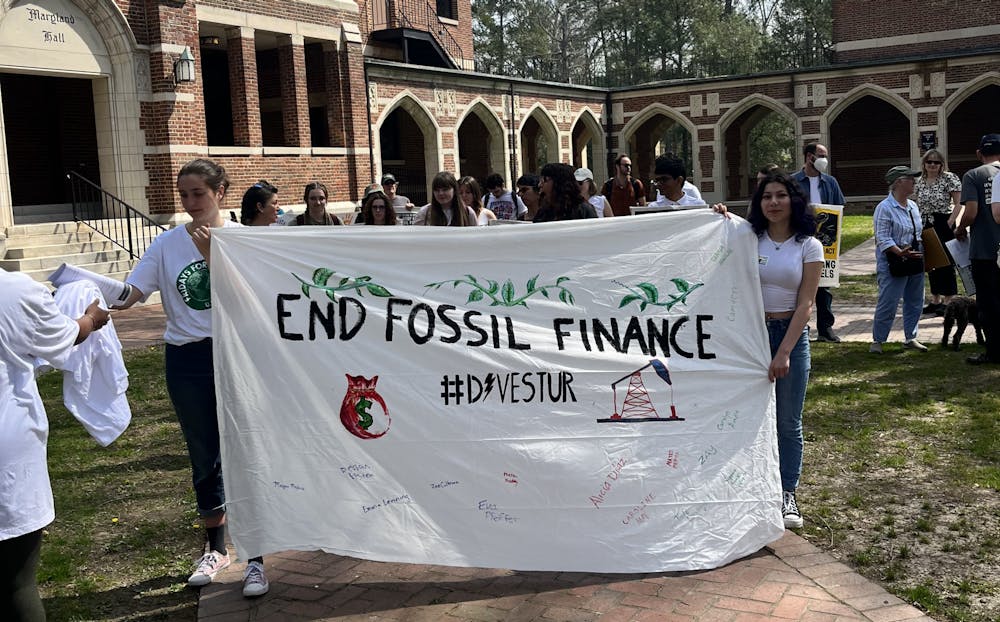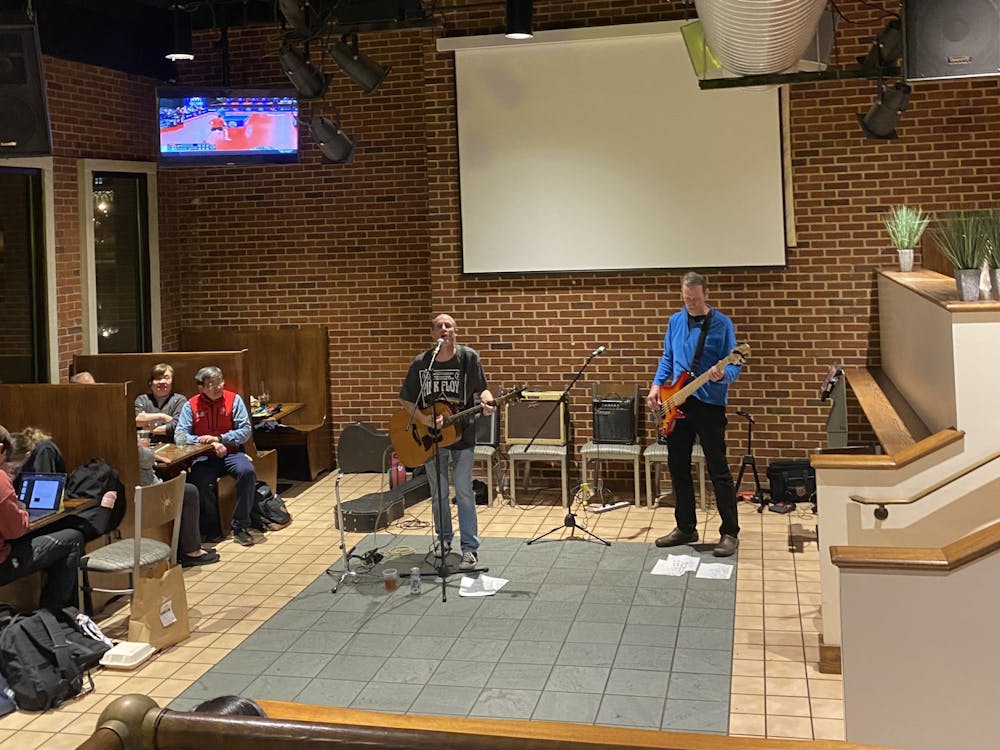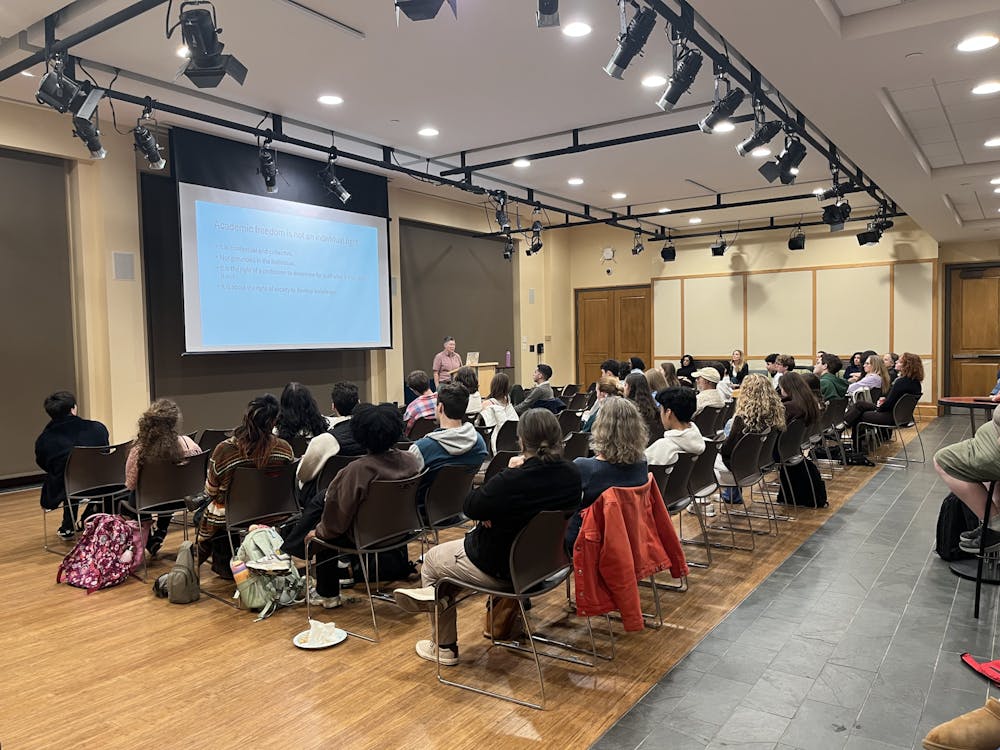GreenUR, a student-run environmental defense organization at the University of Richmond, held a protest on March 25 advocating for the divestment of the school’s $3.2 billion endowment from fossil fuel companies.
The goal of the protest was to call on UR to cease investing the endowment in oil, coal and fossil gas by 2030, according to GreenUR’s email sent to their organization's members.
Three core points the students want to address are the UR investment, operations and education, according to an email sent to The Collegian. They also advocate for reinvesting in the Richmond region, marginalized communities, strengthening the Procurement Policy language and making climate literacy a graduation requirement.
The protest started with a therapeutic grounding session at the Robins School of Business before moving to Maryland Hall, where select speakers discussed the harms of investing in fossil fuels and the university’s role in climate change.
“Fossil fuels are a threat, divestment is a safer bet,” protestors chanted around campus.
The protestors moved to march through the Forum, ending on the front lawn of Boatwright Memorial Library, where another group of speakers shared their closing remarks.
“Do you know the phrase ‘if the people lead the leaders will follow’?” Mary Finely-Brook, associate professor of geography and the environment, said at the protest. “If the students lead, the administration is going to follow, and they’re listening. They hear us because we see climate leadership coming from our students.”
Sophomore Zoe Cultrara, GreenUR’s vice president of communications, helped organize the event.
The team organizing the protest first met with President Kevin Hallock in January to inform him that there were students who supported a divestment movement, Cultrara said. They also met with David Hale, executive vice president and chief operating officer, in February to present divestment strategies the university could implement.
As an environmental studies major and employee of the Office of Sustainability, Cultrara said that she is very involved in the environmental realm, including having attended UR’s first-ever climate strike last semester.
“I thought [the March 25 protest] was really powerful," Cultrara said. "I just remember as we were marching from place to place, you could literally hear the echoes of our chants. We definitely got people's attention.”
GreenUR belongs to the Fridays for Future group, a student strike organization centered on fighting the climate crisis and ecological breakdown, according to their website. GreenUR will be holding regular strikes when they can by the Fridays for Future agendas, Cultrara said.
Enjoy what you're reading?
Signup for our newsletter
Mason Manley, the co-president of GreenUR, served as the lead organizer for the protest and facilitates communication between GreenUR and the United States body of Fridays for Future, he said.
“We just believe that the school we attend shouldn't be investing in ways that are going to be detrimental to its own students' futures,” Manley said. “We know from [the Intergovernmental Panel on Climate Change] reports and lots of other international entities that we need to stop extracting fossil fuels immediately.”
Information about where UR’s endowment goes is not publicly available, so they are not sure how much is going towards energy or fossil fuels, Manley said.
“What we're hoping for is that it rescinds their moral license to operate,” Manley said. “Right now, by being complicit and continuing to invest in their business practices, we're essentially saying that we believe that it's morally fine and morally correct for them to keep burning fossil fuels and keep investing in climate destruction.”
Pulling university investments in fossil fuels would serve as a symbolic act, given the power of these companies, Manley said. Rescinding investments in fossil fuels could also provide more financial stability for UR, he said.
“Investing in fossil fuels is actually a very risky investment,” Manley said. “By continuing to do that, they're going to put financial aid at risk. They're gonna put scholarships at risk. They're going to put the actual liquidity of the institution at risk by continuing to invest in the short term.”
One of the best ways that the student body can help is by continuing the conversations introduced during the protests, Manley said.
“I think we do need to do a better job as an institution and as a student body of normalizing these conversations with our friends and making space right like even if it's just on social time,” Manley said. “This is the biggest threat that we will face in our generation, and it's going to impact our generation the most.”
GreenUR will be holding two events on April 5 and 6 in support of climate justice for Puerto Rico. The April 5 event will consist of a theatrical procession from the Eco-Corridor to the Weinstein International Center commons from 6-7:30 PM. The April 6 event will be a reception and panel about decolonial environmental justice from 6:30-8:30 PM with Yarimar Bonilla, a political anthropologist and director of the Center for Puerto Rican Studies at Hunter College, and Ruth Santiago, a lawyer and environmental health advocate. Both events are open to all and do not require registration.
Contact news writer Caitlin McCormack at caitlin.mccormack@richmond.edu.
Support independent student media
You can make a tax-deductible donation by clicking the button below, which takes you to our secure PayPal account. The page is set up to receive contributions in whatever amount you designate. We look forward to using the money we raise to further our mission of providing honest and accurate information to students, faculty, staff, alumni and others in the general public.
Donate Now



